This is the sixth in a continuing series of my (highly unofficial) trip reports about my travels in Eastern Europe. Those of you who have read the other five Postcard Diaries know that I work for an agency of the U.S. Government; part of my job is international trade promotion-related activities in support of small business. It's a fairly proactive program without much in the way of resources to work with, and whenever there's a success, you get the feeling you can actually make a difference in the world. Eastern Europe is where this seems to work best (I won't bother you with details why that's so), and I've traveled there many times in the past decade. But it's hard to keep in touch with the outside world when I'm there; it costs just too much to telephone North America from Europe (especially from hotels) and I can't afford the cost of daily phone calls (Agency rules limit reimbursement to the equivalent of only about three minutes per week). So instead, I send out one postcard every day whenever I'm on the road, and I try to pack as much information on them as possible I want each one to be not only a stand-alone essay, but also a chapter of an overall larger diary of that trip that would give the reader a vicarious experience of what it's like to work and travel in Eastern Europe. So there's the challenge: be interesting, be entertaining, but above all, be brief! Not always easy, but most every day I was able to find one or two things interesting enough to build a short essay around, even if after a long day, composing that essay wasn't something that I much looked forward to.
After reading through this new assembled collection of cards, I've once again added some comments between the postcards for continuity and transition, and to expand on some things where just wasn't enough room in a postcard. And once again, I hope you enjoy reading about my adventures (and misadventures).
 struggling to get settled in the railcar compartment and got away with my wallet. The monetary
loss (about US$150) was significant but not major. What really hurt was that all my credit cards
were in the wallet, including my ATM card. Recovery is already underway, and I think I will be
OK; I just need to make sure I can get replacements by week's end or I may run out of money.
There are several lessons for me from this near disaster, for sure. And I guess some of the more
important lessons in life are those you don't get in the classroom!
struggling to get settled in the railcar compartment and got away with my wallet. The monetary
loss (about US$150) was significant but not major. What really hurt was that all my credit cards
were in the wallet, including my ATM card. Recovery is already underway, and I think I will be
OK; I just need to make sure I can get replacements by week's end or I may run out of money.
There are several lessons for me from this near disaster, for sure. And I guess some of the more
important lessons in life are those you don't get in the classroom!Looking back at what happened, I can see now that I had been targeted. And they were very, very good; I was plainly not their first victim. There were some obvious mistakes I'd made; I'd drawn attention to myself by neglecting to remove the white airline routing identifier strips from my luggage. I'd forgotten that the Polish train system still does not accept credit cards, so I'd not bothered to put my credit card (or my ATM card, which I'd used to get about US$100 in Polish zloties at the airport) into my money belt. I'd brought a nice slim wallet that was too easy to remove from a pocket. And worst of all, I'd had a short lapse in paying attention to what was going on around me. It didn't take long; less than thirty seconds and they were gone. I found they had also tried to unzip some of my luggage, but they didn't find anything immediately very interesting. But they had known enough to reach into my front pants pocket (I never keep the wallet in my hip pocket), and they were slick enough to create enough confusion for me not to even notice I was being robbed.
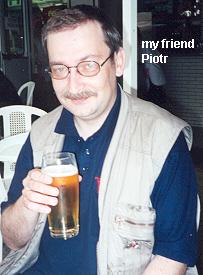 have to do without an ATM card for the rest of the trip. Katowice itself is beginning to turn into
a pleasant place to visit -- outdoor cafés now abound in the downtown area, and they are
good places to kick back with a beer and watch the world go by for an hour or so. The city will
get better yet as time goes by. I hope this trip does, too!
have to do without an ATM card for the rest of the trip. Katowice itself is beginning to turn into
a pleasant place to visit -- outdoor cafés now abound in the downtown area, and they are
good places to kick back with a beer and watch the world go by for an hour or so. The city will
get better yet as time goes by. I hope this trip does, too!The people at Energoprojekt are not only good business allies, they are also good friends. Once they found out I had some problems to overcome, they helped me out in every way they could. My friend, Piotr, who works at Energoprojekt, had met me at the Katowice train station on Sunday night; he immediately provided me unlimited use of his mobile phone to call back to the United States to cancel the stolen credit cards and arrange for replacements. He vouched for me at the hotel so I could check in without a credit card. And even treated me to dinner at one of the many pleasant sidewalk restaurants. I'm in debt to him more than I'll ever be able to repay. But I hope he's never in such a similar situation where he'll need it!
I wish all my money trouble could have been solved as quickly as it took to wire me money through Western Union. I took the necessary information to the Polish bank that was one of WU's representatives in Warsaw, and ten minutes later I was 3,600 zloties (about US$800) richer. And the next day, as promised, not one but two credit cards appeared -- one of them was hand-delivered by someone from work who was attending the same conference as me. Afterwards I felt like a great load had been lifted from my shoulders. Or, on the other hand, with all the business gifts I'd made in Katowice and Warsaw, maybe it was just my luggage getting lighter!
 One of the shops in Warsaw where I can revert to English is my favorite place to buy amber
jewelry in the city. Readers of my previous postcard diaries know that I usually buy an
assortment of amber pendants, necklaces, and earrings for family and friends whenever I'm in
Poland (I usually have some standing orders for these, in fact). The local Polish artisans are
skilled at taking a piece of amber and incorporating it into a silver setting to where it's as much a
work of art as it is a piece of jewelry. The shop that seems to have the best overall selection is
not far from Warsaw's Old Town Square, and I've been there often enough over the past few
years that the proprietors now recognize me when I come in there. Part of it, I'm sure, is that I
spend about US$100 every time I'm there, a large-enough sum where I'm one of their better
customers. My visit there this trip brought a warm greeting and a 10% discount! It's as if we're
old friends, which I guess in a way is true!
One of the shops in Warsaw where I can revert to English is my favorite place to buy amber
jewelry in the city. Readers of my previous postcard diaries know that I usually buy an
assortment of amber pendants, necklaces, and earrings for family and friends whenever I'm in
Poland (I usually have some standing orders for these, in fact). The local Polish artisans are
skilled at taking a piece of amber and incorporating it into a silver setting to where it's as much a
work of art as it is a piece of jewelry. The shop that seems to have the best overall selection is
not far from Warsaw's Old Town Square, and I've been there often enough over the past few
years that the proprietors now recognize me when I come in there. Part of it, I'm sure, is that I
spend about US$100 every time I'm there, a large-enough sum where I'm one of their better
customers. My visit there this trip brought a warm greeting and a 10% discount! It's as if we're
old friends, which I guess in a way is true!
 Thursday, May 11, 2000 (Warsaw)
Thursday, May 11, 2000 (Warsaw)The conference turned out useful for me to attend, not so much for its technical content as for the opportunity to network. In a conference like that, the really important discussions happen in the margins -- at lunch breaks or during the dinner buffets. I'm beginning to thrive in that kind of environment, at least as much as possible for somebody who doesn't have a lot of resources to work with. At any rate, if you don't count the mens room urinal, the first musical event of the trip took place at one of the conference buffet dinners. But the pianist, talented as he was, only had a clunky out-of-tune old upright piano to use, so some of the Chopin he played was a bit painful to listen to. He looked very embarrassed every time the music sounded sour, but on the other hand, he was being paid and was performing before an audience. Anyway, it certainly wasn't nearly one of the better performances I'd ever heard, but it was one of the more courageous!
I have to admire the two ladies who put the conference together. They had only about three months notice, and not all that much of a budget. They were able to use a large meeting room in one of the government buildings of the Polish housing authority, which saved a bunch of money from not having to rent space at a large hotel like the Marriott. And they saved additional money by having all the food functions (two lunches and two dinners) as stand-up-and-mingle buffets. The informality that resulted was pretty refreshing compared to some of the other more pretentious conferences I've been to. And they even had enough money left over to provide a small cultural event the next day for those of us who stayed over to the weekend.
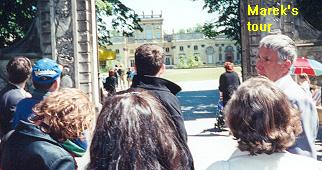 Saturday, May 13, 2000 (Warsaw)
Saturday, May 13, 2000 (Warsaw) Another indication of how small the world is becoming for me is the number of friends I have,
not only in Poland, but in other countries in the region. Before 1990, I barely had any contacts of
any kind in all of Europe; in just a decade I've developed dozens of friendships across the
continent. On my last evening in Poland, I had a pleasant dinner with one such friend, an
expatriot Polish lady named Maryla whom I'd met back in 1992 on a flight from Poland to
Germany. She and her husband had been living in the United States then (her home in Douglass,
Wyoming, had gotten the nickname of the 'Polish Embassy of Wyoming' from the American and
Polish flags they flew in front of the house), but she moved back to northeast Poland after her
husband became sick and died a few years back. We'd become friends on that short flight, and at
her request, I'd sent her picture postcards over the years from my travels. I hear back from her
from time to time, usually wondering if I'm making any progress in my (still meager) knowledge
of the Polish language. I suppose the odds were astronomical against us happening to sit next to
each other on that airplane flight so long ago -- of all the days to travel we had picked that one, of
all the flights we had picked that one, of all the seats in the plane we had picked those two. Of
such happenstance are friendships born.
Another indication of how small the world is becoming for me is the number of friends I have,
not only in Poland, but in other countries in the region. Before 1990, I barely had any contacts of
any kind in all of Europe; in just a decade I've developed dozens of friendships across the
continent. On my last evening in Poland, I had a pleasant dinner with one such friend, an
expatriot Polish lady named Maryla whom I'd met back in 1992 on a flight from Poland to
Germany. She and her husband had been living in the United States then (her home in Douglass,
Wyoming, had gotten the nickname of the 'Polish Embassy of Wyoming' from the American and
Polish flags they flew in front of the house), but she moved back to northeast Poland after her
husband became sick and died a few years back. We'd become friends on that short flight, and at
her request, I'd sent her picture postcards over the years from my travels. I hear back from her
from time to time, usually wondering if I'm making any progress in my (still meager) knowledge
of the Polish language. I suppose the odds were astronomical against us happening to sit next to
each other on that airplane flight so long ago -- of all the days to travel we had picked that one, of
all the flights we had picked that one, of all the seats in the plane we had picked those two. Of
such happenstance are friendships born.
 Sunday, May 14, 2000 (Košice, Slovakia)
Sunday, May 14, 2000 (Košice, Slovakia)Košice is the second-largest city in Slovakia, so maybe it's no surprise that the rejuvenation I'd
noticed in Bratislava in my two previous trips is also happening there. The layout of Košice's old
town is different from either Bratislava's or Warsaw's; there's no well-defined old town square --
instead, a wide avenue passing through the oldest part of the city broadens to become a large
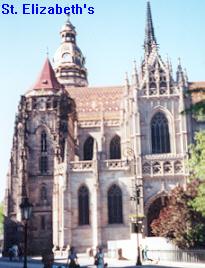 plaza. Right in the middle of the plaza is one of the finer old churches in Central Europe, the
neo-gothic St. Elizabeth's Cathedral, which dates back to the 1300s. On the other hand,
immediately adjacent to the cathedral is the 'musical fountain', which dates back only a year or
two. During the re-hab of Košice's old town, the area in the plaza just north of the cathedral was
made into a small green space with a pool as its dominant feature. And in the pool are devices
that can shoot jets of water high into the air, some of them as high as 25 meters. It's all
programmed to music, so the fountain is, in effect, a dynamic sculpture, with spray patterns
dependent on the music being played. The old town square has come alive after its re-hab; even
relatively late on a Sunday night, most of the sidewalk cafés were still open and doing
reasonably good business. Of course, some of this was probably in celebration of Slovakia's
success at the World Ice Hockey Championships (in St. Petersburg, Russia), which had ended
that same day. Slovakia had made it to the championship game where they had lost to their
neighbor and nemesis, the Czech Republic. Even so, the beer was flowing and many of the
young men in the city were having a very good time; parts of the old town actually seemed more
like New Orleans than Košice. I can only wonder what it would have been like had Slovakia
won!
plaza. Right in the middle of the plaza is one of the finer old churches in Central Europe, the
neo-gothic St. Elizabeth's Cathedral, which dates back to the 1300s. On the other hand,
immediately adjacent to the cathedral is the 'musical fountain', which dates back only a year or
two. During the re-hab of Košice's old town, the area in the plaza just north of the cathedral was
made into a small green space with a pool as its dominant feature. And in the pool are devices
that can shoot jets of water high into the air, some of them as high as 25 meters. It's all
programmed to music, so the fountain is, in effect, a dynamic sculpture, with spray patterns
dependent on the music being played. The old town square has come alive after its re-hab; even
relatively late on a Sunday night, most of the sidewalk cafés were still open and doing
reasonably good business. Of course, some of this was probably in celebration of Slovakia's
success at the World Ice Hockey Championships (in St. Petersburg, Russia), which had ended
that same day. Slovakia had made it to the championship game where they had lost to their
neighbor and nemesis, the Czech Republic. Even so, the beer was flowing and many of the
young men in the city were having a very good time; parts of the old town actually seemed more
like New Orleans than Košice. I can only wonder what it would have been like had Slovakia
won!
Actually, the day's business meetings had more in common than just their intensity. One of the earlier meetings, in Košice, was also held over a meal (lunch); from my experience, business meetings over meals in Slovakia are fairly commonplace. One other thing in common between the two 'meal' meetings of the day was that the host brought out the slivovitz, and we proceeded to make a toast and knock one back. Slivovitz is a very potent plum brandy, about 55% alcohol and very smooth going down. (Not only that, the more you drink, the better it gets.) I've been in meetings where there was toast after toast, each time followed by a deciliter of slivovitz. When that happens, any useful business needs to be done with in a hurry!
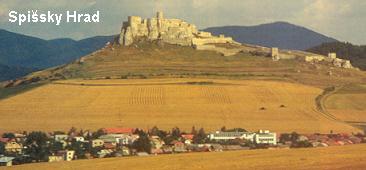 The trip west across Slovakia from Humenné to Zilina took me and my Slovak hosts past
some of the most scenic and historic areas of the country. For instance, Spišsky Hrad, the largest
castle ruins in Slovakia, lies only about one kilometer from the highway. A bit farther along is
the walled medieval city of Levoca, one of the sites in the UNESCO registry of world cultural
and historical places. The cathedral in the center of the city contains the tallest altar in the world,
an ornate work of the 17th century craftsman known as Master Paul. And when the word 'tall' is
mentioned in Slovakia, the High Tatra Mountains, northwest of Levoca, usually come to mind.
These are actually a 50-kilometer section of the Carpathian range, caused by some strange
The trip west across Slovakia from Humenné to Zilina took me and my Slovak hosts past
some of the most scenic and historic areas of the country. For instance, Spišsky Hrad, the largest
castle ruins in Slovakia, lies only about one kilometer from the highway. A bit farther along is
the walled medieval city of Levoca, one of the sites in the UNESCO registry of world cultural
and historical places. The cathedral in the center of the city contains the tallest altar in the world,
an ornate work of the 17th century craftsman known as Master Paul. And when the word 'tall' is
mentioned in Slovakia, the High Tatra Mountains, northwest of Levoca, usually come to mind.
These are actually a 50-kilometer section of the Carpathian range, caused by some strange
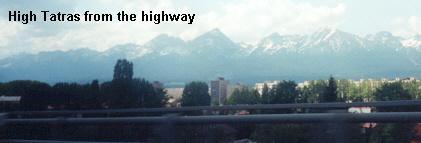 geologic uplift long ago. The High Tatras are very Alpine in nature (unlike the other
Appalachian-like mountains elsewhere in the country) with peaks reaching altitudes of more than
2,700 meters above sea level. They are such an amazing sight that the mind refuses to accept
they really exist; it's almost as if a huge matte painting of rugged snow-capped mountains has
been inserted into the rolling hills and farmlands of the region. And finally, just before reaching
Zilina, there's the 'Grand Canyon of Slovakia' where the Vah River passes through a valley
overlooked by 1,000 meter tall mountains with the ruins of two old castles tossed in just for good
measure. At work, there are people who think I'm crazy for wanting to spend so much time as I
have in such a small off-the-beaten-track country. If they could only see what I've seen and
experienced what I've done they would think I'd be crazy if I didn't want to.
geologic uplift long ago. The High Tatras are very Alpine in nature (unlike the other
Appalachian-like mountains elsewhere in the country) with peaks reaching altitudes of more than
2,700 meters above sea level. They are such an amazing sight that the mind refuses to accept
they really exist; it's almost as if a huge matte painting of rugged snow-capped mountains has
been inserted into the rolling hills and farmlands of the region. And finally, just before reaching
Zilina, there's the 'Grand Canyon of Slovakia' where the Vah River passes through a valley
overlooked by 1,000 meter tall mountains with the ruins of two old castles tossed in just for good
measure. At work, there are people who think I'm crazy for wanting to spend so much time as I
have in such a small off-the-beaten-track country. If they could only see what I've seen and
experienced what I've done they would think I'd be crazy if I didn't want to.
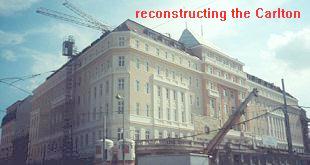 Wednesday night, May 17, 2000 (Bratislava, Slovakia)
Wednesday night, May 17, 2000 (Bratislava, Slovakia)The changes have become less dramatic over the past few years. My first trip to Bratislava was in March 1995, and there wasn't much to see or do. The old town mostly consisted of abandoned buildings with missing or broken windows and crumbling masonry. Even as recent as a year-and-a-half ago, there were still some buildings on some of the outlying areas of the old town that were that way. Now, the whole area has become valuable, and all the years of neglect have mostly been swept away. Almost every street has shops and restaurants, and many countries have relocated their embassies there. Bratislava's old town is now a place that's full of life, something I would have thought impossible after my first visit only a half decade ago.
 Thursday, May 18, 2000 (Bratislava)
Thursday, May 18, 2000 (Bratislava)On the way back from the meeting we stopped for lunch in Nitra, a city of about 100,000 people. There's an impressive castle there (which is really more of a small walled community since there's a cathedral within the castle walls) but the place that was of most interest to Diana, our translator, was the Bonsai Shop. She went in there to buy some specialty teas, but what grabbed my attention were the bonsai itself -- miniature trees as an artform. There were dozens of them for sale in there (none very cheap, even for Slovakia), each one perhaps destined for the office or study of some businessman or entrepreneur who could afford them. And then it struck me -- none of those little trees were meant for me, not for me nor any other tourist or businessperson from out-of-country; they were only intended for native Slovaks! Because of strict agriculture quarantine regulations in the United States and the European Union, there is no way for a tourist to bring a bonsai out of Slovakia. It's a sign that the Slovak economy is continuing to improve that shops like this are now possible.
 Friday afternoon, May 19, 2000 (Bratislava)
Friday afternoon, May 19, 2000 (Bratislava) Well, I guess I should be grateful that it wasn't nearly as much an adventure as I'd expected -- we
only went to three places (all in the old town) and I only about equaled my Previous Best in
amount of beer consumed (I lost count near the end of the night). It was a pretty nice evening,
actually; there was pleasant and amusing conversation as we all attempted to bridge the language
barrier. The last place we visited was actually a pretty good little restaurant not far from the
Michael's Tower, my favorite building in the city and an amazing, stunning sight in the early
evening against a deep blue twilight. It turns out that you can go up to the 'balcony', about
halfway up the tower (which I did the next day), and from there you can get a bird's eye view of
the old town streets below you and beyond that, Bratislava's fortress castle on the hill that guards
over the city. It's just another example of how nice a city and how interesting Bratislava has
become. I doubt I'll ever get tired of going there.
Well, I guess I should be grateful that it wasn't nearly as much an adventure as I'd expected -- we
only went to three places (all in the old town) and I only about equaled my Previous Best in
amount of beer consumed (I lost count near the end of the night). It was a pretty nice evening,
actually; there was pleasant and amusing conversation as we all attempted to bridge the language
barrier. The last place we visited was actually a pretty good little restaurant not far from the
Michael's Tower, my favorite building in the city and an amazing, stunning sight in the early
evening against a deep blue twilight. It turns out that you can go up to the 'balcony', about
halfway up the tower (which I did the next day), and from there you can get a bird's eye view of
the old town streets below you and beyond that, Bratislava's fortress castle on the hill that guards
over the city. It's just another example of how nice a city and how interesting Bratislava has
become. I doubt I'll ever get tired of going there.
It turned out that there had been a symphony concert on Thursday night, after all -- the Slovak Philharmonic Orchestra featured a program that included Khachaturian's Violin Concerto and also one of my favorite orchestral works, Dvorak's 9th "New World" Symphony. I'd checked all the 'upcoming events' posters near the Filharmonia Hall, but this concert was elsewhere in the city. There was just a single poster advertising it in the Old Town Square that I'd missed seeing until Saturday afternoon. I was disappointed not to have found out about the concert until it was too late, but I wasn't disappointed about how my week in Slovakia had come out. The power developer's representative was very encouraged by what he saw, and all five opportunities he investigated are (for now, at least) worth pursuing -- a total worth of about US$80 million for the five combined. It was a very successful week, and made me look forward to the last leg of my trip, to Bulgaria...
 Sunday evening, May 21, 2000 (Sofia, Bulgaria)
Sunday evening, May 21, 2000 (Sofia, Bulgaria)And then there was the Hotel Lulin (I'm sparing you the Cyrillic Bulgarian spellings here; all
names and places are the Roman alphabet spellings instead), which by the time I left it I was
nearly ready to nominate for another such dynamite job. I'd originally picked it mostly because
of its low room rate (about US$35 per night), a case of frugality overruling common sense. This
trip started out about US$1,000 over budget from the get-go because our new travel agent didn't
look very hard for reasonably-priced airline tickets, so I'd been trying to cut costs wherever
possible to make up for it. At any rate, the hotel was clean enough, but at US$35 per night I
 wasn't surprised by the lack of luxuries such as air conditioning. I was surprised, though, by the
lack of non-luxuries like a shower, for instance -- the bathroom had a shower head and controls,
but they were mounted on the wall of the bathroom and all the water went down a floor drain in
front of the commode. My stay at the Lulin was the first (and hopefully only) time I've ever been
able to take a shower while sitting on the toilet. Besides that, there was the telephone, a clunky
old dial unit which didn't work at much of the time; the one night it did, if you didn't complete
dialing the number you were calling within about ten seconds, you'd get an intermittent beep
dial-error sound. No coat hangers there, either, so the back of a chair had to suffice. And the lift
wasn't working either, even though they had promised me it would be back in service "soon"
(three weeks was probably a better estimate, from its state of deconstruction) -- my room was a
long four flights up the stairs. But the funkiest thing about the Lulin was the room numbering
system -- my room, 404, was right next to room 42. Room 41 was across the hall, and the other
rooms on the floor were numbered consecutively from 403 to 413 -- rooms 401 and 402 didn't
exist. Anyway, two days of the Hotel Lulin was as much as I could stand, and I checked into a
much nicer, though more expensive place to stay -- I decided that maybe the travel budget wasn't
in such bad shape, after all!
wasn't surprised by the lack of luxuries such as air conditioning. I was surprised, though, by the
lack of non-luxuries like a shower, for instance -- the bathroom had a shower head and controls,
but they were mounted on the wall of the bathroom and all the water went down a floor drain in
front of the commode. My stay at the Lulin was the first (and hopefully only) time I've ever been
able to take a shower while sitting on the toilet. Besides that, there was the telephone, a clunky
old dial unit which didn't work at much of the time; the one night it did, if you didn't complete
dialing the number you were calling within about ten seconds, you'd get an intermittent beep
dial-error sound. No coat hangers there, either, so the back of a chair had to suffice. And the lift
wasn't working either, even though they had promised me it would be back in service "soon"
(three weeks was probably a better estimate, from its state of deconstruction) -- my room was a
long four flights up the stairs. But the funkiest thing about the Lulin was the room numbering
system -- my room, 404, was right next to room 42. Room 41 was across the hall, and the other
rooms on the floor were numbered consecutively from 403 to 413 -- rooms 401 and 402 didn't
exist. Anyway, two days of the Hotel Lulin was as much as I could stand, and I checked into a
much nicer, though more expensive place to stay -- I decided that maybe the travel budget wasn't
in such bad shape, after all!
 Monday night, May 22, 2000 (Sofia)
Monday night, May 22, 2000 (Sofia)In all there were about 15-20 people at the meeting (many who spoke passable English), including two of Bulgaria's science fiction writers (they each autographed one of their books for me). Even though I'm not a fiction writer, I was still asked my opinion of the status of science fiction and fantasy today. Is cyberpunk evolving? (Yes, the latest 'hot button' seems to be nanotechnology; virtual reality and AI are becoming passé.) Did I know any science fiction writers? (Yes, many. Mike Resnick, Jack Chalker, Greg Benford, Alexis Gilliland, Allen Steele, and S.N. Dyer are personal friends, in fact.) What are some of my favorite stories? (Too many to catalog, actually, but "The Sentinel" by Arthur Clarke, "Remembering Siri" by Dan Simmons, and "Population Implosion" by Andrew Offutt are definitely in my Top Five.) I mentioned that I do a bit of traveling, so they asked me for a funny travel story (I told them a story from one of my previous Postcard Diaries, about almost having my briefcase stolen in Budapest, and how it led to a bargain price for a watercolor painting I'd been wanting). It went on and on, and much sooner than I expected, it was ten o'clock and people started drifting away to go home. But before I left, the club presented me with a copy of their publication, signed and personalized by everybody who had attended. It was as if they were signing a high school yearbook! I was a bit overwhelmed by their show of friendship, but now I'm going to have to learn to read Bulgarian to figure out what they all wrote!
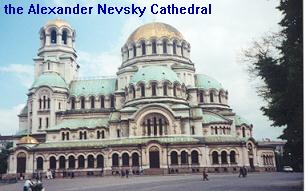 My ever-evolving day's schedule for Tuesday included an early evening meeting with a power
developer company's in-country representative (over a beer, of course), and then an
hour-and-a-half at a local Internet café to catch up on a few days of unread e-mail. The
way back to the hotel took me first through the plaza where the wonderful Alexander Nevsky
Cathedral resides (it's an even better sight lit up at night than it is during the day) and then
through a pedestrian subway where there were still a few small convenience kiosks open. When
I stopped at one to buy a snack, the two young guys who were manning the shop immediately
'made' me as an American (I'm always puzzled at how they can do that when I don't say anything)
and began trying out their English on me. Turns out one of them had recently graduated from
college with a degree in Chemistry, and due to the high unemployment rate, this was the best he'd
been able to do for himself so far. We talked about what the future might hold for Bulgaria (at
least five years of reconstructing the country, which has already started); we talked about the
steadily improving economy and how it would eventually lead to a better job for him (I told him
not to lose his self-confidence and sense of self-worth -- those were his most valuable assets). He
mentioned he wanted to come to North America someday, but didn't know if he would ever be
able to afford it; I told him I was 40 years old before I managed my first trip to Europe, and that
he still had a lot of living to do. He seemed to take heart in that, and said he would remember. I
eventually looked at my watch and saw I'd been talking to him for more than an hour, so we said
good-bye and I walked back to my hotel, glad that I'd seemed to make at least a small difference
in his outlook for the future. Thinking back over the day's events, I'd had what I'd considered
several important meetings. But maybe, in the long run, this last one was maybe the most
important of all.
My ever-evolving day's schedule for Tuesday included an early evening meeting with a power
developer company's in-country representative (over a beer, of course), and then an
hour-and-a-half at a local Internet café to catch up on a few days of unread e-mail. The
way back to the hotel took me first through the plaza where the wonderful Alexander Nevsky
Cathedral resides (it's an even better sight lit up at night than it is during the day) and then
through a pedestrian subway where there were still a few small convenience kiosks open. When
I stopped at one to buy a snack, the two young guys who were manning the shop immediately
'made' me as an American (I'm always puzzled at how they can do that when I don't say anything)
and began trying out their English on me. Turns out one of them had recently graduated from
college with a degree in Chemistry, and due to the high unemployment rate, this was the best he'd
been able to do for himself so far. We talked about what the future might hold for Bulgaria (at
least five years of reconstructing the country, which has already started); we talked about the
steadily improving economy and how it would eventually lead to a better job for him (I told him
not to lose his self-confidence and sense of self-worth -- those were his most valuable assets). He
mentioned he wanted to come to North America someday, but didn't know if he would ever be
able to afford it; I told him I was 40 years old before I managed my first trip to Europe, and that
he still had a lot of living to do. He seemed to take heart in that, and said he would remember. I
eventually looked at my watch and saw I'd been talking to him for more than an hour, so we said
good-bye and I walked back to my hotel, glad that I'd seemed to make at least a small difference
in his outlook for the future. Thinking back over the day's events, I'd had what I'd considered
several important meetings. But maybe, in the long run, this last one was maybe the most
important of all.
 Wednesday, May 24, 2000 (Sofia)
Wednesday, May 24, 2000 (Sofia) Another of the congregating points for the celebration was the plaza surrounding the Cathedral of
Alexander Nevsky, the building that's probably the 'signature' image most visitors to Sofia come
away with. My favorite building in the city, though, is the so-called 'Russian Church',
which is less impressive in size than the Nevsky cathedral but much more elegant and beautiful.
I only much later found out that the actual name for the Russian Church is the Church of St.
Nicholas. But when I told the lady at my hotel's registration desk that I thought the St. Nicholas
church was nicer, actually, than the Nevsky Cathedral, she shrugged and conceded that it did
have a reasonable amount of elegance -- for a *Russian* church! I guess the Soviet-style
communism that ended over a decade ago is still pretty fresh in people's memories!
Another of the congregating points for the celebration was the plaza surrounding the Cathedral of
Alexander Nevsky, the building that's probably the 'signature' image most visitors to Sofia come
away with. My favorite building in the city, though, is the so-called 'Russian Church',
which is less impressive in size than the Nevsky cathedral but much more elegant and beautiful.
I only much later found out that the actual name for the Russian Church is the Church of St.
Nicholas. But when I told the lady at my hotel's registration desk that I thought the St. Nicholas
church was nicer, actually, than the Nevsky Cathedral, she shrugged and conceded that it did
have a reasonable amount of elegance -- for a *Russian* church! I guess the Soviet-style
communism that ended over a decade ago is still pretty fresh in people's memories!
The tall Alpine-like mountains are called the 'Rila', and while they're no match in size to the real
Alps, the tallest of them still extend up to over 2,900 meters -- taller than the highest peak in
Slovakia's High Tatras. It seems to take me about a week to get used to the Cyrillic alphabet
used by the Bulgarian language each time I'm in the country, so by the time the day for the road
trip arrived, reading the road map wasn't all that much of a challenge. Actually, Bulgarian might
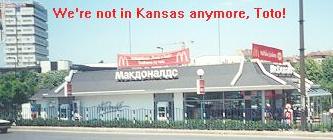 be the easiest of all the Slavic-type languages to learn, once you do get used to the alphabet. For
instance, I've picked up a reasonable Slovak vocabulary in all the times I've been there, but my
grammar is horrible because nouns, adjectives and verbs all decline in Slovak -- a different
spelling is used depending on context. I'm told that Bulgarian isn't like that -- it's similar to
English in that only the verbs decline (as in 'I am', 'you are', 'he is', etc.). I've also seen that many
Bulgarian words, once you transcribe to Roman alphabet spellings, are very similar to English
ones. All this prompted me to make the rather arrogant statement in a meeting on my next-to-last
day in Sofia that if I were there for six months, I could become fluent. What's surprising is that
the other people in the meeting believed me, I think!
be the easiest of all the Slavic-type languages to learn, once you do get used to the alphabet. For
instance, I've picked up a reasonable Slovak vocabulary in all the times I've been there, but my
grammar is horrible because nouns, adjectives and verbs all decline in Slovak -- a different
spelling is used depending on context. I'm told that Bulgarian isn't like that -- it's similar to
English in that only the verbs decline (as in 'I am', 'you are', 'he is', etc.). I've also seen that many
Bulgarian words, once you transcribe to Roman alphabet spellings, are very similar to English
ones. All this prompted me to make the rather arrogant statement in a meeting on my next-to-last
day in Sofia that if I were there for six months, I could become fluent. What's surprising is that
the other people in the meeting believed me, I think!
It really was a very good performance, though, and as the days went on I started to think better and better of it. You really can feel the organ's presence with more than just your sense of hearing, and that's something you can't experience by listening to a recording of that symphony. I think I see more classical music performed on my infrequent business trips to Europe than during the entire rest of the year in the United States. Part of the reason is cost -- events like a symphony concert are much, much less expensive in Bulgaria (the ticket cost was 5 lev, or less than US$2.50), and another part is that my evenings on the road are more available for events like that than when I'm home. But I also think the overall culture in Europe is more attuned to evening events like concerts, or classical music in general. For instance, there's a cable television channel from France called 'Muzzik' that I could watch at my hotel. It featured commercial-free classical music, jazz, opera, and ballet; I was pleased to find a series of recitals of some of Beethoven's more famous piano sonatas by a talented pianist named Georges Plundermacher. The Muzzik channel was as if our Public Broadcasting System had begun an all-music format service, which isn't a bad idea, come to think of it. I know I'd be an avid viewer!
 Saturday night, May 27, 2000 (Sofia)
Saturday night, May 27, 2000 (Sofia)Back on my very first day in Poland, at the start of that train ride from Warsaw to Katowice, all I knew was that I was in big trouble -- it would be three hours before I even arrived in Katowice and I'd not planned on meeting my friend Piotr (or anybody else, for that matter) at the train station. And the thieves had that three hours head start with my credit cards before I could even start to look for a way out of the mess I was in. But it turned out that the man sitting across the cubicle from me (who luckily spoke some English) saw what had happened and wanted to do something to help. So he took out his mobile phone (everybody seemed to have one in Poland) and called ahead to his wife, who found Piotr's listing in the telephone directory. We then called Piotr directly from the train and got confirmation he would be at the Katowice station; after that, I started feeling a bit better about things.
But there's more -- after talking to his wife (and not knowing that the thieves hadn't gotten away with all of my cash), the man told me that he and his wife wanted to loan me some money! He didn't even know my name, or anything about me except that I was a foreigner in need, and he was going to provide me money. He had his wallet out and was starting to pull out some cash before I stopped him. It was maybe the defining moment of the entire trip, and it happened on the very first day; what had been a nightmarish experience was transformed, right then and there, into something positive and memorable. After that, I was certain some good things would happen the rest of the way, and I was pretty much right. There were a lot of people who played a large part in making those good things happen, some of whom I meet every time I'm in Europe and some (like that man) I'll never see again. I can't thank him in person; I can only thank him here. There's a lot to experience in the countries I visit in Central and Eastern Europe, and one of the purposes of these travel diaries is to try to let the readers vicariously see the region alongside me. But this trip showed me once again that maybe the best thing to celebrate about the region is the people who live there. I think that, as much as any other reason, is why I look forward to going back there again.